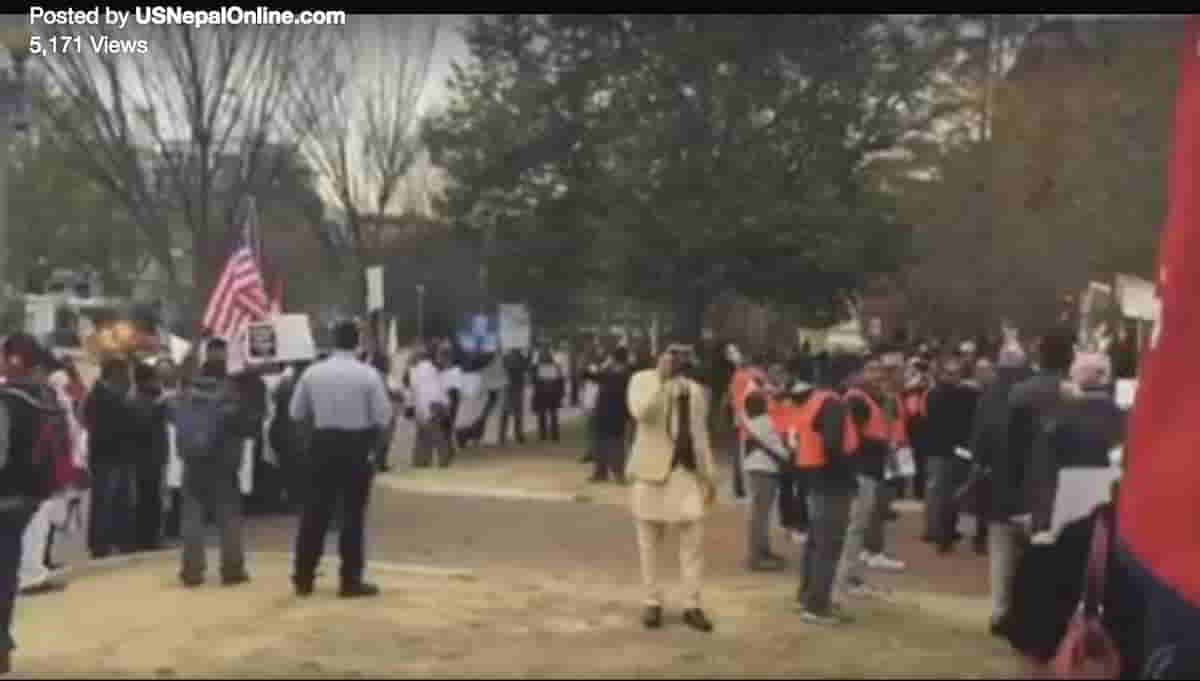Of course, I have always suspected mainstream media in Nepal of being biased.
But, still, I want to ask: is the way the three mainstream publications covered the recent protests in Washington DC just an aberration or is that the norm?
Of the two groups of “Nepalese” who held protests in front of the White House two days ago, one was protesting against the blockade imposed by the Indian government; the other was protesting against the Government of Nepal (GoN). The second group was protesting in support of the ongoing protests in the Southern Plains, asking the GoN to resolve the issue.
(Nepalese is in quotes to include people of Nepalese origin and/or heritage who live abroad in developed countries and may even be permanent residents or citizens of that country.)
Three mainstream dailies, whose combined circulation is probably bigger than that of the rest of the other English dailies combined, covered the protests…well…covered!
The Himalayan Times article headlined “Nepalis in US stage demonstrations against Indo-Nepal border blockade.” The article described in detail the former protest but devoted only three sentences at the bottom to the latter.
The Kathmandu Post article headlined “Nepalis protest in front of White House (with video)” and tagged “Post Report, Washington DC,” carried four photos, a 50 second video and eight sentences on the activities of the group protesting the blockade. The protest against the GoN appears to have made it into the article as an after thought — as a single photo and a single sentence right at the bottom.
Republica was the worst.
Alleging that “thousands of Nepali origin [sic] people residing in USA participated in the demonstration,” the article headlined “Nepalis stage demo against Indian blockade in Washington (with photos/video),” included six photos and a minute-long video of the protests against the blockade. The other protest didn’t even get a mention…anywhere!
We know the two protests took place at the SAME TIME, in the SAME PLACE because, unlike the ones published by the mainstream media, other videos exist showing just that.
A video of the protests posted on Facebook (see below) starts off with those protesting against the GoN.
But at the 42 second mark, it pans to the other group and shows them until the 54 second mark, and again from 1:52 min to the 2:07 min mark. From 3:18 to 3:52, at least part of the time, you can see both groups in the frame (see image below)!

This online news article, published from the US, however, does mention both the protests in its headline AND also includes videos of both.
So, to reiterate the question: are these just aberrations or is media in Kathmandu always as biased as these examples indicate?
And what of the other “Nepalese” people in other developed countries?
I understand protests against the blockade have been held in other countries too, such as the UK, Australia etc. by “Nepalese” living there.
Don’t get me wrong, I am NOT happy that Nepal is suffering from this blockade. Of course not! I have family and friends suffering because of the blockade as well as the earthquake. The village of Thangpalkot, where we, COMMITTED, work, and where I know many people, lost 594 of the 600 houses to the earthquake, for instance! The beautiful people of Thangpalkot and its neighbors, having already suffered the humiliation of the GoN not even acknowledging their existence for the last seven months since the earthquake, have a long, cold winter to look forward to, to say nothing of the rest of issues they face.
Regardless, here are some questions I have.
What percentage of Nepalese living in the US, the UK and Australia taking part in these protests are from the Southern Plains and have friends and families, for instance, in the region? What percentage are from somewhere else in Nepal? What percentage from Kathmandu?
Why did there appear to be so many more “Nepalese” protesting in Washington against the blockade than against the GoN’s inaction over the Madhes issue (and no protests against the GoN’s inaction over the plight of the earthquake victims)?
And what of the Nepalese abroad elsewhere?
What percentage of the millions of Nepalese migrant workers living and working as semi- and unskilled laborers in countries like India, Malaysia, Saudi Arabia, Qatar and other Gulf countries come from families in Kathmandu?
Let’s say for argument’s sake that those migrant workers could take time off from work, organize themselves and take out a street rally and protest against what’s been going on in Nepal. What or who would they be protesting against and why? Do you know?
Would they protest against the Government of Nepal (GoN) over their inaction rehabilitating earthquake victims? Against the GoN dragging their feet to resolve the issues with the Madhesis? Against the Indian blockade? Or against a combination of the three? Or against all three?
Should some unforeseen event of political nature involving the Chinese government and the people of Mustang transpire threatening the very existence of the fragile culture, people and the area, will the “Nepalese” people rise up in protest?
Or, should I not even be asking these questions? Is it unpatriotic of me to be raising these questions because they cast doubt on the implicit “unity in diversity” that so many Nepalese take for granted?
* * * * * * * *
References
-
The Himalayan Times: Nepalis in US stage demonstrations against Indo-Nepal border blockade.
-
Kathmandu Post: Nepalis protest in front of White House (with video)“.
- Republica: Nepalis stage demo against Indian blockade in Washington (with photos/video).
-
USNepalonline dot Com: डिसिमा ह्वाईट हाउस सामुन्ने दुई नेपाली समूहद्वारा भारतीय नाकाबन्दी र नेपाल सरकारको बिरुद्ध समानान्तर बिरोध प्रदर्शन.

